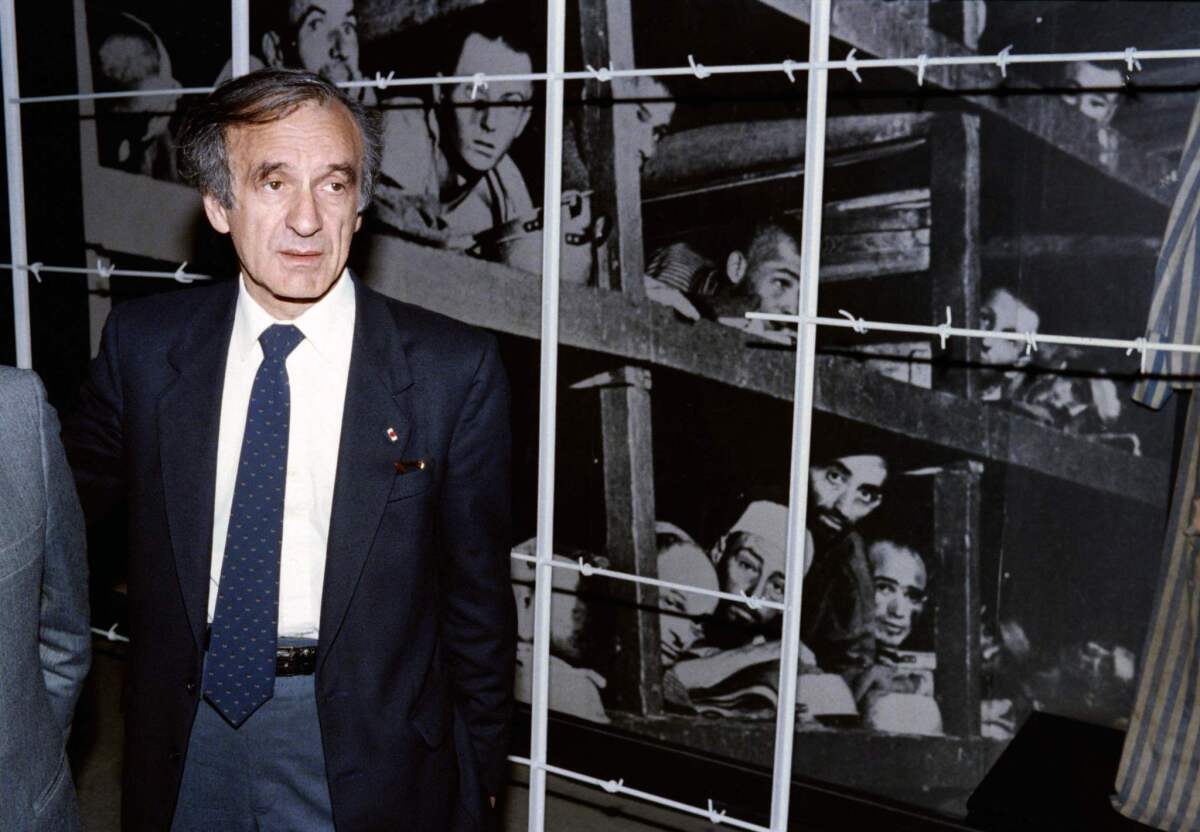Elie Wiesel ‘died as a hero in Israel,’ but it wasn’t always that way

- Share via
Reporting from Tel Aviv — Elie Wiesel never made Israel his home, but Israelis considered the author and Nobel Peace Prize laureate as one of their own anyway.
In the hours after the announcement of Wiesel’s death, the country’s leading political and intellectual dignitaries paid tribute to him with eloquent expressions of mourning, while Israel’s news media dedicated front-page headlines and broadcast time to the world’s “most famous” Holocaust survivor.
“I knew Elie for over 40 years as one of the people who contributed the most to the memory of the Holocaust,’’ said Prime Minister Benjamin Netanyahu at his weekly Cabinet meeting Sunday. “He gave powerful expression to our people to emerge from the darkest hour and shed a bright light on its future.”
OBITUARY: Elie Wiesel dies at 87; Nobel Peace Prize laureate and renowned Holocaust survivor »
Wiesel’s evolution from avoiding writing about the Holocaust in the initial years after World War II to eventually embracing his trauma through memoirs and novels parallels Israel’s changing relationship with the memory of the Nazi genocide and those who survived it.
“Eli Wiesel died as a hero in Israel, but it took him many years to become an Israeli hero,’’ said Yossi Klein Halevi, an Israeli American author and a fellow at the Shalom Hartman Institute in Jerusalem.
“In the early years of the state, Holocaust survivors were resented by native-born Israelis for their supposed passivity during the war. Elie Wiesel’s mission to centralize Holocaust memory in Jewish identity didn’t find a place in the Israeli ethos,” Halevi said. “Over the years, Israelis began to understand the Holocaust in a much more nuanced way, and not just as a story of Jewish passivity, and began to see survivors generally and Wiesel in particular as heroes of the spirit.”
Israel’s state-run television noted that Wiesel twice declined offers to be nominated to the country’s largely symbolic office of president. On Sunday, former Israeli President and Prime Minister Shimon Peres praised Wiesel for “upholding the legacy of the Holocaust and delivering a message of peace and respect between people worldwide.”
Writing in Yediot Aharonot, the newspaper that Wiesel once wrote for as an international correspondent, columnist Nahum Barnea described Wiesel as the “personification of conscience, morality and humanitarian values.” Barnea praised his Hebrew as “eloquent and fluent.”
Although he never immigrated, “he mobilized all of his influence on world leaders and international public opinion for Israel’s sake,’’ Barnea wrote. “He had quite a bit of criticism for policies of Israeli governments, but refrained from expressing it’’ because he didn’t live in the country.
Indeed, in a state shaped by a generation of Holocaust survivors and their children, identification with Wiesel’s writings and his voice proved more meaningful than his place of residence.
“Elie Wiesel wrote for me everything that our parents said after the Holocaust — he wrote about the sadness of God abandoning his people,’’ said Aryeh Golan, a news host at Israel’s state-run radio channel and the child of Holocaust survivors. “It’s the truth of our parents that they talked about every day.”
Yad Vashem, Israel’s Holocaust memorial and research center, first made the announcement Saturday night of Wiesel’s passing and on Sunday released a statement from the institution’s chairman, Avner Shalev, praising Wiesel as “a loyal member of the Jewish nation” and his commitment to “bearing witness to the atrocities he witnessed.”
A private funeral was held Sunday in New York.

Robert Rozett, director of the Yad Vashem libraries, said Wiesel influenced the Israeli institution through his focus on individual experiences during the Holocaust, his insistence on drawing moral lessons rather than teaching it as dry history, and his insistence on the centrality of the genocide of Jews amid the Holocaust’s universal importance
“We were allies in the idea that those messages didn’t get lost,’’ Rozett said. “He was a voice that influenced us.”
Mitnick is a special correspondent.
From the Archives: Elie Wiesel’s own words: A testament to survival
Holocaust survivors gather to mark 1945 liberation from Auschwitz
What’s behind the sharp decline in lone-wolf stabbing attacks in the West Bank
More to Read
Sign up for Essential California
The most important California stories and recommendations in your inbox every morning.
You may occasionally receive promotional content from the Los Angeles Times.










